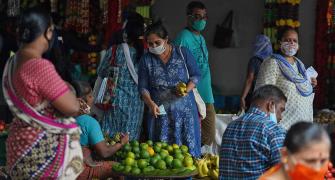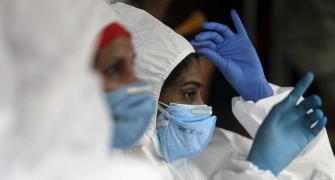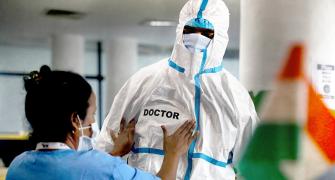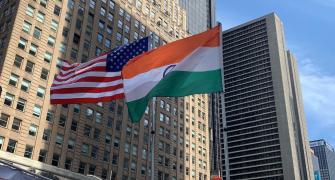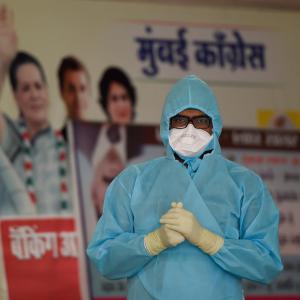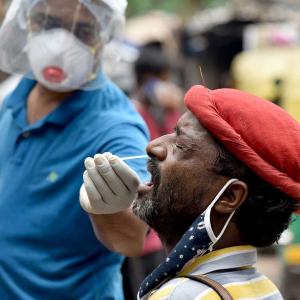'People who have diabetes or heart disease or high blood pressure seem to be more badly affected by the disease.'
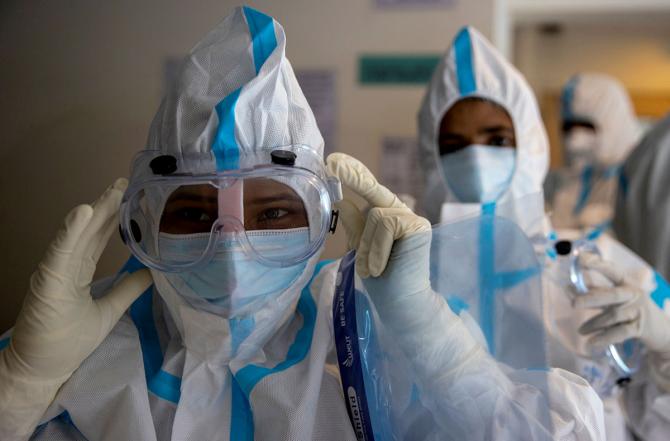
A trip to Italy from Australia in February this year changed Professor Jeremy K Nicholson's life.
It changed his work focus.
And his personal life too.
He learned that SARS-COV-2, responsible for COVID-19, was not simply a deadly respiratory virus temporarily running riot in the lungs, but caused effects that may stay with you all your life.
Professor Nicholson's research on the frightening multi-organ metabolic nature of COVID-19 gives us many reasons why we should take our mask wearing, social distancing and other precautions even more seriously -- ten times more seriously -- and steer clear of COVID-19 entirely.
A pro-vice chancellor of the health sciences at Murdoch University in Perth, western Australia, Professor Nicholson spent many years at Imperial College, London, where he was the head of the biological chemistry department and subsequently the head of the department of surgery and cancer.
He started up MRC-National Phenome Centre at Imperial College, the world's first.
In 2012, while remaining professor emeritus at the Imperial College, he moved to Australia to head the Australian National Phenome Centre, which is right now concentrating on COVID-19 research.
A team of researchers of ANPC and the University of Cambridge, working jointly, to show the kind of widespread multiple effect COVID-19 has on the human body, have put together a predictive metabolic model for the disease.
Using phenotyping* technology and by studying the blood plasma of positive and negative people, according to Professor Nicholson: 'To effectively navigate the coming waves of COVID-19, we need to be able to accurately diagnose and predict the severity of disease for infected individuals at an early stage so that they can be more effectively monitored and managed'.
In Part I of his interview to Vaihayasi Pande Daniel/Rediff.com, Professor Nicholson explains the consequences of COVID-19 on your physiology.
I had a question in the context of your multi-organ metabolic disorder research on COVID-19, where COVID-19 turns people into diabetics and gives them liver disease, heart disease and blood dysfunction.
Were these people slated to get these diseases a little bit later and because of COVID-19 they got them earlier?
Or they have gotten them now only because of COVID-19?
People who have already got diabetes or heart disease or high blood pressure seem to be more badly affected by the disease.
They are more likely to get severe effects.
But the thing that's complex, really complicated is the fact that the disease looks as if it can -- what we call -- create a new onset presentation.
Actually, most of the people who get COVID-19 -- from what we've seen so far -- get some sort of diabetic symptoms.
They can have very high blood glucose and a lot of lipoprotein changes that are consistent with diabetes.
So, the majority of the cases of diabetes are actually coming from the disease itself.
And if you have diabetes already, then you get a sort of double dose of it, which is really, really bad for you.
A group in London, at the Imperial College, have also shown that children -- up to 20 per cent of them -- can get diabetes with COVID-19.
That, of course, is very, very worrying in the long term.
And then on top of that, there's also signs from the biochemistry -- of liver disease, and cardiovascular disease.
The virus attacks blood vessels.
It can attack any part in the body technically.
In addition to lung symptoms, there's also a lot of background symptoms as well, which often go unnoticed, because doctors are really concerned with the lung disease control now.
What's worrying is quite a lot of people have probably got some new disease, liver damage and diabetes and that might be missed.
If it is missed, it is more likely to make the overall disease pattern worse and increase the chances of morbidity and mortality.

So, it seems as if COVID-19 brings these ailments, like diabetes specifically.
It is difficult to say whether they would have gotten it in the normal course in any case?
No, no, I don't think that's the case.
COVID-19 has absolutely caused it.
We have got so many patients, who are in the clinics, and they have signs of diabetes.
But they've never had diabetes before.
They're not on any anti-diabetic therapy.
There are some people who are already diabetic and you know they are, because they are on some sort of anti-diabetic therapy.
Then there are a lot of people that are now clearly diabetic (post COVID-19) from their blood biochemistry, but they're not being treated.
If the doctors knew (after they had finished treating them for COVID-19) how bad their blood chemistry was, they would be treating them for diabetes.
So, we know that they don't know.
We don't quite know what percentage of people it is yet.
But if you look back at the original SARS (Severe Acute Respiratory Syndrome) in 2003, a very large proportion of those people got long-term diabetic-like effects.
Sixty per cent or more had elevated triglyceride levels, abnormal blood glucose levels and they also had a significant portion of liver damage.
So, the original SARS-1 caused this long term.
We don't know whether SARS-2 virus (responsible for COVID-19) causes this short term and it then reverses, more like gestational diabetes**, or it (the diabetic symptoms) is actually going to be present for a long time.
We simply don't know that.
There are not enough follow-up studies.
So, let me make sure I am clear: It seems COVID-19 has caused diabetes in people who may not have gotten diabetes normally?
Yes, that's correct.
Or it might have taken many, many more years to get it.
It certainly accelerated the process and it's in quite a high proportion of the patients.
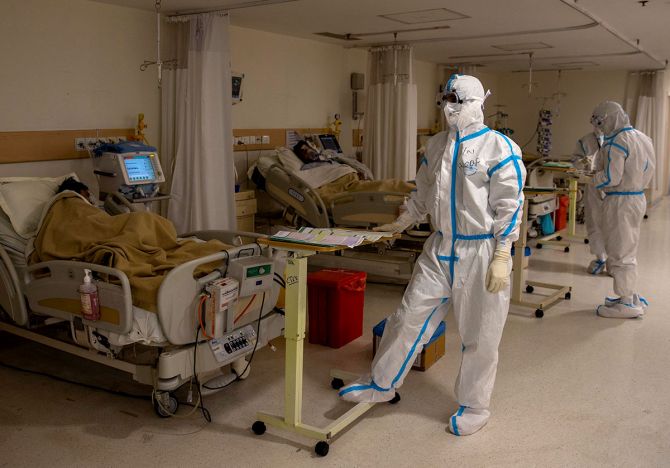
And what proportion are you seeing it in roughly?
I'm talking about probably more than 80 per cent patients.
Certainly, while they are in hospital have gotten diabetic symptoms.
We don't know whether they will get reversed.
We know that some of them do and others do not.
We haven't studied enough people yet to know what the reversible versus non-reversible numbers are.
We will know the answer fairly soon, because we were doing a joint study with the University of Cambridge, where we're following up a couple hundred people over the next year or two or so, who've already had COVID-19.
We're following up every three months, six months, a year into it and we'll be able to work that out.
But obviously the disease is quite new, so knowing what the long-term actual outcomes are is not possible for anybody to say yet, because nobody has had it that long.
But based on SARS-1, there is a chance, correct?
There's a significant chance, I would say, because of what we know already from the original SARS.
But what we need to hope is that it is not as bad with COVID-19 as the original SARS was, in terms of the long-term effects.
As a lay person it is difficult to understand the immunity issue.
Is it like the parallel example of a common cold?
If one person gets a cold in the household, it's possible that the other people in the same home get some sort of mild immunity and don't get the cold or somebody gets just a milder version of the same cold.
Apart from the fact that you may be at a higher risk of getting COVID-19, if you don't take certain important precautions, are there some people at a higher risk of getting it, regardless?
While for others it just sort of passes them by, and they don't get it at all, or there's maybe a sort of in-between stage, like the cold, or they are asymptomatic.
What does it look like to you?
Yes, it is a very good question.
Of course, all good questions are difficult to answer.
So, some people probably are largely immune to it anyway, because of their experience of being exposed to other viruses and have built up a level of immunity.
Immunity is complicated.
It's both from antibodies and it is also cellular.
Cellular immunity is where there are cells programmed to kill viruses.
So, it's possible that even some people, who have no antibodies, may still have some immunity, because they have so called killer T-cells (a type of lymphocyte) which are primed to attack viruses that look like it (like COVID-19, because of dealing with similar, earlier viruses).
We don't know enough about the immunology of this yet.
It looks like you need cellular immunity, the cells that kill bugs, and also the immunity from humoral antibodies*** to be really well protected.
The vaccine, of course, only stimulates the humoral response, the antibody production.
It doesn't affect, as far as we know, the cellular variety.
Actually, I'm not sure.
I simply don't know that.
But it may not affect the cellular response side of it.
So, the vaccine addresses one part of the problem, as far as I can see.
But the other thing is that your immune system is incredibly complex.
It is affected by all sorts of things, your overall state of health, your nutrition.
If you're malnourished, your immune system is very poor.
If you are old your immune system is very poor.
If you are old and malnourished there is a very big risk of getting a severe version of the disease.
Obviously, of course, in India, there are quite a lot of malnourished people which is very, very worrying.
But the main feature that sets apart how good your immune system is your microbiology.
That's all the different bacteria that live normally inside your gut.
And people are very, very different in what bugs live inside them. And that may have an influence, as well, on whether or not you're going to get severely infected by the disease.
We simply do not know.
There will be lots of different features and factors that will affect different people in different ways.
The answers of which we will learn those over the next year or so.
So, that means the risk of contracting this disease differs person to person?
And if two people, unknowingly, sit on each on either side of somebody who is sick or severely sick with COVID-19, there's a chance that one person might get it and the other will get away without getting it?
That is absolutely correct.
That is definitely true.
We had a colleague who got sick.
He was incorrectly diagnosed as being COVID-19 negative.
He definitely had it, because his family had the antibodies later.
He had a meeting in an office the day before he fell sick, and one person in the meeting caught the disease and the other person did not.
We have seen it (this phenomenon) in our own (backyard).
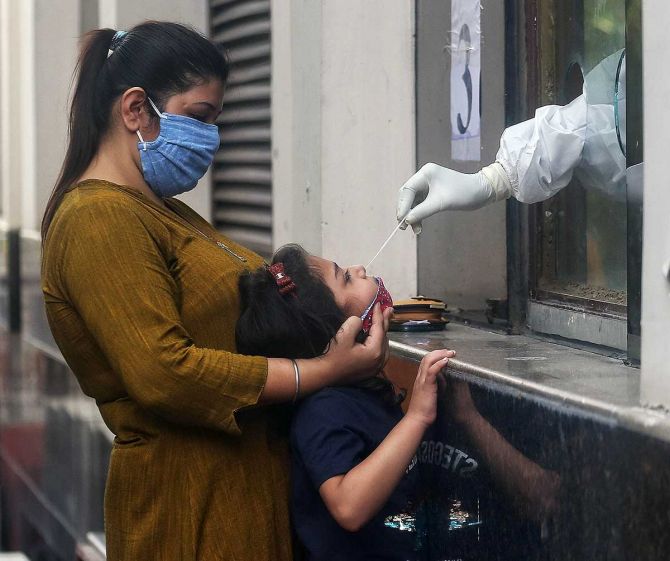
I have been told that COVID-19 is not more mysterious than other typical respiratory virus-caused illnesses of the same ilk.
For you, what is the most curious and unusual aspect about COVID-19?
In another interview you mentioned it is a more complex disease than anything anybody has ever seen before.
You cannot call this just a respiratory disease. Because it isn't.
It is a multi-system disease.
That is very, very evident.
So, there are people who get diabetes, as I've said that already.
There are children, it is being reported, who, it looks like now, are getting Type 1 diabetes.
There are people who have been reported to have renal failure.
It causes brain damage.
It causes gut damage.
It causes liver damage and it looks as though it affects the cardiovascular system.
The thing about the virus is that is completely different to anything we've seen before.
It is because it attacks blood vessels, the lining of blood vessels, all over the body.
So, in the lungs - which obviously has got lots of blood vessels in its tissue, because that's where oxygen exchange occurs -- are a high target for the virus.
But there's lots of other tissues that have got a lot of blood vessels -- the kidney and obviously the brain.
There's quite a lot of evidence now that there's brain injury.
I am not going to speculate, since the publication is not out yet, but there's lots of different ways the virus can affect brain -- in really complicated ways and effectively the system too.
We're are trying to understand the biological nature of the disease, right, so, we're better able to think about how we manage patients who have the disease.
Certainly, just treating people for lung symptoms is not really accurate, because there's lots of other abnormal biochemistry going on at the same time.
And certainly, people just thinking they've recovered when they left the hospital is a (false) promise here, because they may not have recovered at all.
And in fact, many people who never get to the hospital, may still have evidence of the disease.
Because the diabetes and liver problems are independent of the severity of the lung issues.
I don't think people fully understand that.
I can tell you from my own personal point of view - I have had COVID-19.
 IMAGE: Professor Jeremy K Nicholson, pro-vice chancellor of health sciences at Murdoch University, Perth, western Australia.
IMAGE: Professor Jeremy K Nicholson, pro-vice chancellor of health sciences at Murdoch University, Perth, western Australia.Did I hear correctly?
You said you have had COVID-19?
I have had COVID-19.
I got it in a conference in Italy.
I flew back from Italy to Australia in February.
I was not sick.
When I got back, I was very, very tired.
I thought that I had really bad jetlag.
But it lasted well over a week and I very slowly sort of got back to work.
I felt like I was too tired to go out.
And then four months later, I was tested as part of our scientific studies.
And I was antibody positive for the virus.
And not only that -- my biochemistry changed.
So I am now a diabetic and I didn't used to be.
And I also have liver damage and I didn't used to have that.
So, I know personally what happens.
I am perfectly fit.
I had a mild version of it.
But I have abnormal blood chemistry which shows me to be a diabetic and I wasn't before.
*The activity or process of determining, analysing, or predicting all or part of an organism's observable characteristics or traits, that are produced by the interaction of its genotype or genetic constitution and the environment, according the Merriam-Webster Dictionary.
**Gestational diabetes is when during pregnancy women experience elevated blood sugar.
*** The type of immunity that is facilitated by macromolecules located in extracellular fluids.
It is called humoral immunity because it deals with substances in the humors or the body fluids.
Feature Presentation: Ashish Narsale/Rediff.com


